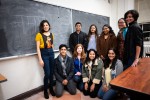Abel Thomas lost most of his ability to speak his first language, Malayalam, when he immigrated to the United States in 2005 at the age of 6.
He said he was disheartened by his inability to speak with his family members who lived in India and to sustain emotional connections with them.
Thomas, a second-year psychobiology student, joined Bhasha to learn how to connect with other Indians and with his family. Bhasha is a student organization at UCLA that aims to teach undergraduates about Indian languages and culture through the instruction of postdoctoral students.
Meetings are held every Friday in Moore 1003 and consist of four hour-long sessions run by different graduate students who each teach different languages. Members have the option of learning Hindi, Malayalam, Tamil and Telugu, and can attend as many sessions per meeting as they want to.
Bhasha was created in 2016 by Nathaniel Varghese, a fourth-year psychobiology student; Vineet Mathew, a fourth-year computational and systems biology student; and Adarsh Nair, a fourth-year mathematics/economics student. Bhasha started as an initiative to celebrate different Indian traditions and culture, Varghese said. The founders then realized that a great way to celebrate their culture would be to learn and teach the languages of India.
However, Varghese said they realized they were not qualified to teach the languages themselves and that they needed outside help. They found teachers who could prepare language lessons for undergraduates by reaching out to the Graduate Indian Student Association and by approaching interested strangers on the street.
However, the aim of Bhasha is not to mimic a traditional classroom. Games and jokes are highly encouraged throughout the meetings to spark curiosity and foster the joy of learning in students, Varghese said. Laughter and failure are accepted as a natural part of the learning and development process, he added.
Varghese said he realizes students can find it difficult to attend another class at the end of the day, so the club aims to make meetings as enjoyable as possible for members by creating a relaxed, comedic atmosphere.
Thomas, Bhasha’s vice president, said one of his best memories of Bhasha was the first meeting he ever attended. The teacher and fellow members made multiple jokes and created a warm, inviting environment. He said he knew immediately after leaving the meeting this was an organization he wanted to be a part of.
Bhasha encourages learning for fun without the stress of having to study for a grade, Varghese said.
Bhasha allows members to not only learn the technical aspects of their language but to also gain a deeper understanding of their families’ cultures. Several Bhasha members said they think there is a cultural gap between the younger and older generations in their families and that relearning their mother languages allows them to better understand their families’ struggles and experiences.
Venya Vaddi, a first-year microbiology, immunology and molecular genetics student and a general member of Bhasha, has relatives currently living in India who only speak Hindi.
Vaddi said Bhasha has allowed her to communicate more frequently with her grandparents, aunts and uncles who live in India.
“I do want to stay in touch with my family, even though we’re in a different country, so far away. I think my parents feel they have a piece of home,” she said. “At least at home we speak our mother language. … I think that’s something I’d want to pass down to my kids.”
Vaddi added that Bhasha has allowed her to maintain her connection with her relatives.
Varghese said Bhasha hopes to one day start a YouTube channel to teach Indian languages and culture to anyone who is willing to learn.
